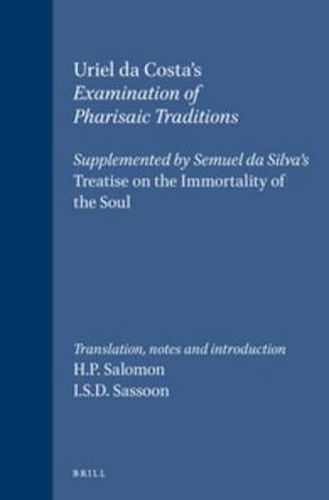Readings Newsletter
Become a Readings Member to make your shopping experience even easier.
Sign in or sign up for free!
You’re not far away from qualifying for FREE standard shipping within Australia
You’ve qualified for FREE standard shipping within Australia
The cart is loading…






Da Costa’s book rejects the divine origin of the rabbinic tradition. His insight was that what he calls Pharisaism is irreconcilable with the religion of the Pentateuch and therefore cannot derive from the same source. He claims, for example, that the Law of Moses does not allow for a belief in an afterlife for individual human beings. Concomitantly he denied the Mosaic origin of the notion of eternal punishment. The rabbinic reading of the Mosaic Law appearded to him almost as great a falsification as the Christian one. Yet there could be no reversion to Christianity and despite his deep rift with the synagogue he still believed in ultimate redemption for the Jewish people. As he declares in his closing sonnet, Israel’s rehabilitation depends on its shedding man-made doctrines and holding fast to the Law in its purity. This work should interest students of 17th century intellectual history; religious philosophy; the history of Bible criticism; comparative religion; Portugeuse exile literature; the Portugeuse settlement at Amsterdam and Hamburg; the Portugeuse New Christian saga; Jewish history and literature; intellectual life; and printing in 17th century Amsterdam.
$9.00 standard shipping within Australia
FREE standard shipping within Australia for orders over $100.00
Express & International shipping calculated at checkout
Da Costa’s book rejects the divine origin of the rabbinic tradition. His insight was that what he calls Pharisaism is irreconcilable with the religion of the Pentateuch and therefore cannot derive from the same source. He claims, for example, that the Law of Moses does not allow for a belief in an afterlife for individual human beings. Concomitantly he denied the Mosaic origin of the notion of eternal punishment. The rabbinic reading of the Mosaic Law appearded to him almost as great a falsification as the Christian one. Yet there could be no reversion to Christianity and despite his deep rift with the synagogue he still believed in ultimate redemption for the Jewish people. As he declares in his closing sonnet, Israel’s rehabilitation depends on its shedding man-made doctrines and holding fast to the Law in its purity. This work should interest students of 17th century intellectual history; religious philosophy; the history of Bible criticism; comparative religion; Portugeuse exile literature; the Portugeuse settlement at Amsterdam and Hamburg; the Portugeuse New Christian saga; Jewish history and literature; intellectual life; and printing in 17th century Amsterdam.